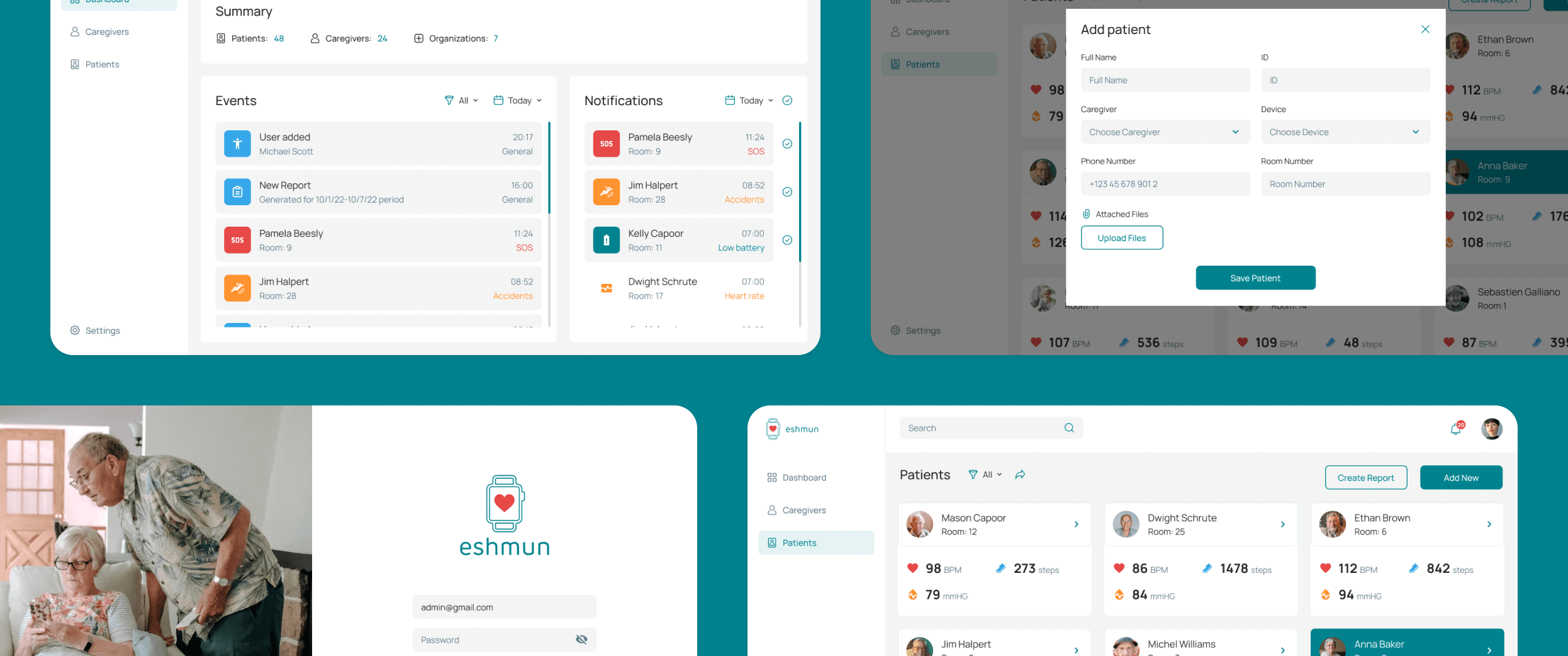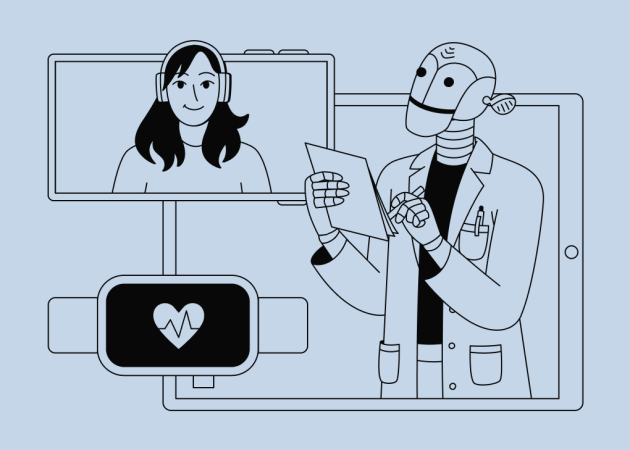
CTOs at the Forefront of Healthcare Trends: Strategies for Staying Ahead in a Rapidly Changing Industry
Contents
Contents
HealthTech CTOs are at the forefront of embracing healthcare trends and innovation-related risks and overcoming barriers in the highly-regulated industry landscape. And the pressure of global economic recession only magnifies the challenge.
As a development partner for healthtech startups, we’ve identified the following significant challenges that Chief Technology Officers will face in 2023 and beyond. Read on to compare our observations with your own and determine strategies to successfully navigate rapid changes and stay resilient to the global economy’s fluctuations.
Managing Complex Technologies and Systems
The primary responsibility of CTOs in the healthtech sector is to build and monitor the implementation of technology strategies, which result in enhanced patient experience, thereby securing better health outcomes.
The list of technologies on a CTO’s plate depends on the digital health product type and can be extensive, including EMR/EHR management systems, IoT, big data in healthcare, AR and VR, blockchain, and more. In addition, interoperability and compliance with local regulatory standards such as HIPAA, GDPR, and PIPEDA are essential for tech executives to manage.
The pressure on CTOs to balance data protection with the need to pursue ROI can be particularly intense during tough economic times:
- Investors and customers expect the organization to deliver value for money and high-quality products and services.
- Regulators require the organization to comply with various data protection and security regulations, which can be time-consuming and costly.
To manage these challenges, CTOs may need to hire experts with experience in regulated industries such as consumer tech and fintech. Some of the benefits of this solution include the following:
- Fresh perspectives and best practices from similar fields
- Broader talent pool to find specialists with experience in dealing with complex regulatory requirements
- Enhanced reputation by demonstrating to stakeholders that the company is willing to invest in data security and learn from other industries
Staying Up-to-date with Healthcare Industry Trends and Advancements
Advancements in medical research, digital transformation of the industry, adoption of EHRs and telemedicine, and overall development of technologies are the factors that are driving the healthcare industry today. So naturally, CTOs must constantly keep their finger on the pulse of innovations to catch up with competitors. Here are some tips that can help do just that:
- Networking with colleagues, partners, and industry experts, whether by interacting on social media or attending healthcare community events
- Following niche media sources to read the latest papers, surveys, news, and current trends in healthcare. The list can include Healthcare IT News, Becker’s Hospital Review, and Healthcare Innovation.
- Attending healthcare tech conferences and events to stay informed of the latest innovations and gain valuable insights directly from specialists that create them
- Exploring case studies on how other healthcare organizations successfully adopt healthcare market trends
- Leveraging open-source technology available for use, modification, and distribution can save your organization money and facilitate effective collaborations between developers and users, thus significantly improving the solutions.

Recruiting and Retaining Top Talent
Digitalization of healthcare processes and the rapid development of technologically advanced healthcare trends like telemedicine have increased the demand for skilled IT experts with experience in this complex industry. The senior talent shortage is among the most significant challenges health tech CTOs face. And taking the economic recession into account, this issue is becoming harder to crack.
Despite the inevitable difficulties, companies prioritize growing revenue and attracting new customers. Hence, according to a recent Clutch survey, 83% of small and midsize businesses will maintain or increase their spending on outsourcing in 2023.
The trend is entirely organic, especially considering that outsourcing companies can bring more than financial benefits or access to a broader talent pool. A tech partner like Beetroot cares about the success of your project and provides guidance to help you achieve your goals. Additionally, a tech company with diverse experience in different industries can offer valuable perspectives and expertise you may lack.
Beetroot’s history is all about partnering up with like-minded businesses and organizations. We create a positive difference in the world with our clients through tech, including impactful health tech solutions.

Balancing Innovation with Regulatory Compliance
The healthcare industry is highly regulated, so it can sometimes be at odds with innovative technologies. Still, while this clash is one of the challenges facing healthcare organizations today, here are some ways to facilitate the process of matching innovation with industry standards:
- Stay up-to-date with global and regional industry regulations so that each innovative addition to your organization’s system complies with relevant requirements and guidelines.
- Involve compliance experts and hire developers well-familiar with tackling relevant issues.
- Conduct risk assessments and test innovations you plan to adopt in a controlled environment to determine prospective patient safety and data security hazards before they can cause harm to your organization.
- Document your compliance actions to demonstrate accountability to regulators, investors, and customers.
- Reach out to regulatory bodies to ensure that your solutions meet their standards if you have any questions, hesitations, or concerns.
Repercussions that come with not following healthcare rules and regulations hit hard regarding financial and reputation losses, whether you represent small startups or the biggest health tech companies. However, by following these steps, CTOs in the healthcare industry can ensure the innovations they plan to integrate bear no potential liabilities.
Addressing Concerns Around AI Technology in Healthcare
In 2023, artificial intelligence is changing nearly every industry, so it has ended up on the list of the most promising healthcare technology trends.
Improving diagnostic practices, making healthcare more widely accessible, and enhancing the quality of treatment are just a few examples of how the biggest healthtech companies employ AI.
Doctors today use AI-powered real-time guidance in surgeries and AI tools for medical imaging, and these technologies have already proven incredibly efficient. For instance, AI technology used for breast ultrasound diagnosis has proven to reduce false positives by 37% compared to scans that don’t use AI.
In addition to improved diagnostic accuracy, the benefits of AI in healthcare include the following:
- Increased efficiency by taking over routine tasks and automating healthcare provider back office
- Personalized medicine with custom AI-generated treatment plans based on analyzing a patient’s medical history
- Cost reduction through increased overall efficiency and reduced medical errors and misdiagnoses
Such results leave no doubt that the future of AI in healthcare is quite promising. However, there are still risks to be aware of when integrating these technologies into medical systems.
Some of the critical AI-related IT challenges in healthcare for tech leaders to consider include patient privacy and data security issues, potential biases, cyber-attacks, flawed data, integration issues, and ethical risks when implementing AI solutions. To tackle these challenges, CTOs can:
- Ensure that data fed to AI models are stored and transferred per security guidelines and inform patients about using their records to protect their privacy.
- Regularly review AI solutions to detect and eliminate biases and discrimination against patient populations to ensure they provide everyone equal care.
- Implement robust cybersecurity measures to safeguard against data breaches and cyber attacks, such as data encryption, multi-factor authentication, and employee training on safe data handling practices.
- Work with data scientists to ensure that AI models are trained on high-quality, diverse data that accurately reflect the populations they are designed to serve.
- Address integration issues by designing AI solutions that work seamlessly with existing electronic health record systems, medical devices, and other healthcare technologies. Finally, invest in education and training to ensure healthcare providers and staff can use AI systems effectively.
Risk of Job Displacement
As AI technology becomes more advanced, some tasks traditionally performed by healthcare providers may become automated, potentially leading to workforce displacement. To address this risk, technology executives can:
- Work closely with healthcare providers to identify areas where AI can augment or enhance their work rather than replace it entirely.
- Invest in retraining and reskilling programs for healthcare providers and staff to prepare them for new roles that emerge as AI is adopted more widely.
- Foster a culture of innovation and experimentation that encourages healthcare providers and staff to collaborate with AI systems to improve patient outcomes rather than seeing them as a threat.
- Educate patients and the public about the benefits and limitations of AI in healthcare to build trust and confidence in these systems.
By taking a thoughtful, proactive approach to adopt AI, health tech companies can help ensure that AI solutions provide high-quality, accurate, and secure patient care and create new opportunities for healthcare providers and staff to work alongside these powerful new tools.
Managing in Times of Economic Recession
After the rise of tech stocks during 2020 and 2021, the industry is now going through a market decline. As a result, tech companies are looking for ways to increase their efficiency while reducing costs — and such factors as the growth of salaries, tech talent shortage, and high turnover among IT specialists don’t make this task easier.
To the top, 2023 has raised even more concerns in light of the SVB (Silicon Valley Bank) collapse and overall economic recession that may lead to cash flow and investment issues. Businesses and organizations, including ones in healthcare, might struggle to find funding for tech innovations under these circumstances.
So, how can CTOs in healthcare deal with the challenges of implementing new technology in healthcare? We suggest considering the following strategies:
- Diversifying funding sources through options like crowdfunding opportunities, reaching out to venture capital firms, introducing new services, and partnering up with other healthcare companies
- Leveraging data analytics to effectively determine areas within healthcare systems that can significantly benefit from introducing new technology solutions
- Cautious management of cash flow through studying revenue streams, monitoring and analyzing expenses, optimizing revenue cycle management, and investing in optimization-oriented technology
- Prioritizing projects based on their potential ROI and impact on both business and patient care
- Exploring cost-saving opportunities, such as adopting cost-effective technologies, conducting regular audits of existing solutions, outsourcing tech tasks to third-party partners, etc.
Collaboration as a Solution
Leading technology strategies in the healthcare industry is undoubtedly challenging, as discussed in this article. However, CTOs can take comfort in the fact that they don’t have to face these challenges alone.
Success often comes from working closely with colleagues, stakeholders, regulatory bodies, industry experts, and IT partners. Thus, Beetroot is here to help you overcome various problems with technology in healthcare and make the most of the opportunities the tech world offers today.
Subscribe to blog updates
Get the best new articles in your inbox. Get the lastest content first.
Recent articles from our magazine
Contact Us
Find out how we can help extend your tech team for sustainable growth.






